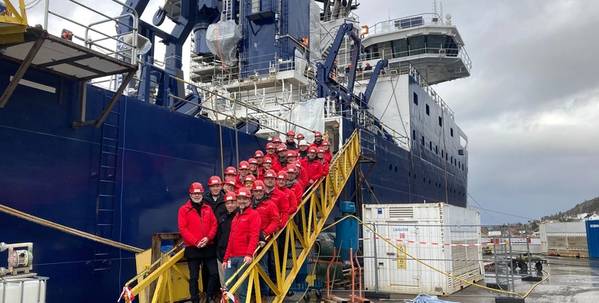
A project aimed developing a solution to charge offshore vessels' batteries in the offshore wind farms was officially launched at a kick-off ceremony in Ålesund, Norway on Thursday.
The project, called the Ocean Charger will be lead by Vard, with its sister companies Seaonics and Vard Electro, and partners Rem Offshore, Solstad Offshore, SINTEF Energi, SINTEF Ocean, DigiCat, Sustainable Energy, Equinor, Source Galileo Norge, Corvus Energy, Plug, Shoreline, Sustainable Energy, University of Bergen, Norce, and Maritime CleanTech.
"Now, with a strong consortium of industry and research partners, VARD will lead the way from research to testing, validation, and commercialization of new technological solutions for energy transfer to battery-powered ships offshore," Vard said.
"Developing the offshore wind industry in Norway will drive significant new maritime activity, including a new fleet and maritime infrastructure. The launch of the Ocean Charger project marks an important milestone toward creating a green, maritime value chain for offshore wind, and we are very excited to take part in this project," says Head of Innovation in Maritime CleanTech, Øystein Huglen.
Under construction at VARD Søviknes, the Construction Service Operation Vessel CSOV REM Power is the first vessel to partake in the testing of Ocean Charger project. By connecting vessels to the power grid in the wind farm or harbor and charging batteries regularly, the aim is to power operations with a minimum additional energy sources, Vard said.
In December 2022, the Ocean Charger project was awarded 38 million NOK through the Norwegian Government's support scheme The Green Platform Initiative.
The Norwegian Minister of Trade, Industry and Fisheries, Jan Christian Vestre, launched the new project at a press conference in Oslo: "We are carrying out the largest restructuring of the Norwegian economy ever. Everything will become greener. It is private companies that must lead the way in this transformation, with the public sector as a supporter," Vestre said.
In the coming years, a substantial new maritime infrastructure will be developed and built for the offshore wind industry in Norway. Based on the development for other segments, batteries have proven to be the most mature technology for zero or low-emission vessels. This technology constitutes the basis for developing the Ocean Charger project, VARD said.
By connecting vessels to the power grid in the wind farm and charging batteries regularly, the operational availability of emission-free vessel operations will be secured. The aim is to power operations in the field without using any additional energy sources, VARD said.



